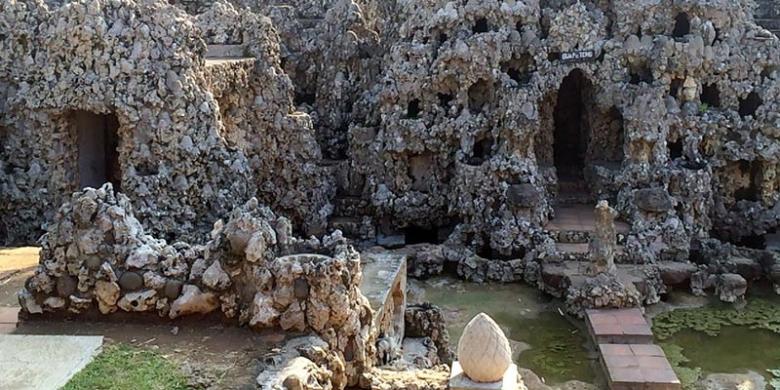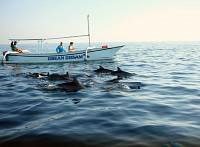
Goa Sunyaragi, Reef as a Symbol of the Underworld |
| Posted by Eko Prasetyo on Thu Jun 25, 2015 |

GOA (cave) Sunyaragi still a mystery to researchers. One question that has so far unanswered is where it came from the building drawn inspiration from the rock.
Many versions disclosed to explain the presence of rocks that stuck all over the walls of Goa Sunyaragi. According to folklore Carub version Kanda, inspiring shades of coral stone buildings was obtained Sunan Gunung Jati through his dreams.
As told Mulyana Yusuf, spokesman maintained Sunyaragi
Goa, supposedly the sunan dream of seeing the palace that looks unclear and irregular. That dream came repeatedly. One time, came the merchant ships that carry cargo from China rocks rely on the Port of Cirebon.
"Sunan picked up some rocks, then try to stack them and he was surprised because the irregular shape of the stone was the spitting image of his dreams," said Mulyana. Sunan then tell his dream and coral rocks that Chinese ships transported it to one of his relatives, Prince Sejong, who later became the architect Sunyaragi.
The first time you build Sunyaragi, Losari style aesthetic design of the building as Wadasan which meant to resemble rocks. In the next stage of development, the 17th century, after Sunan Gunung Jati died, the aesthetic design of the building was designed by a follower Nio Ong Tien, wife of Sunan Gunung Jati. To cave in the middle, they take style mega cloudy.
Archaeologists from the Archaeological Institute of Bandung, Nana Saptono, say, building patterned rock characterizes the cultural arts of Cirebon. Rock or wadasanitu is a symbol of the underworld, the world of men. The world's top or the gods symbolized by the form of clouds or clouds.
He said, in any building related to Cirebon's always a motive Wadasan. In some places in Cirebon, for example in the palace belonged to one of the nobles Gebang Cirebon, also found the building patterned rocks though only partially. Kanoman also adopted rock motif.
"Sunyaragi is building the biggest rock in Cirebon," said Nana who had done research on the ecology of the site Sunyaragi. Judging from the various types of rock used to build the garden sari, she concluded, the rocks were brought in from different locations.
Some coral species used is limestone or limestone old, some even have formed a layer of marble. Such corals, he added, comes from karst region (limestone hills) Kromong
Mountains in the south of Cirebon.
Goa Sunyaragi also easy to find coral recruits are shaped like coral reefs. Such coral taken from the seabed. However, Nana has not been able to find out why the style of building rock had only been in the area of ​​Cirebon, do not spread to other areas.
Researchers from the National Archaeological Center, Bambang Budi Utomo, which examines many of the temple, saying, style as the temple at Sunyaragi until now is still a mystery. He himself believed, such a pattern exists only in Cirebon and does not spread to other places. Perhaps this is related to cultural influences typical Cirebonan not dominant in the border region of West Java and Central Java.
Another characteristic of a typical building of Cirebon was a short door. It depicts an ancient philosophy that has always reminded that as humans we must always be humble because there zatlain higher and powerful than humans. In addition, those who ducked in through the door when it is expected to also always respect older people.
In the scientific journal uploaded on Journal.unpar.ac.id volume 1 (2012), written Pujianto, landscape garden was built with the philosophy sari parks in China. The balance of yin element in the development of Goa Sunyaragi, namely the use of elements of hard rock, then balanced with elements, namely a soft water.
OTHER BALI ACTIVITIES
OTHER BALI TOURS
OTHER BALI PACKAGES
Last changed: Thu Jun 25, 2015 at 11:07 am
comments powered by Disqus








